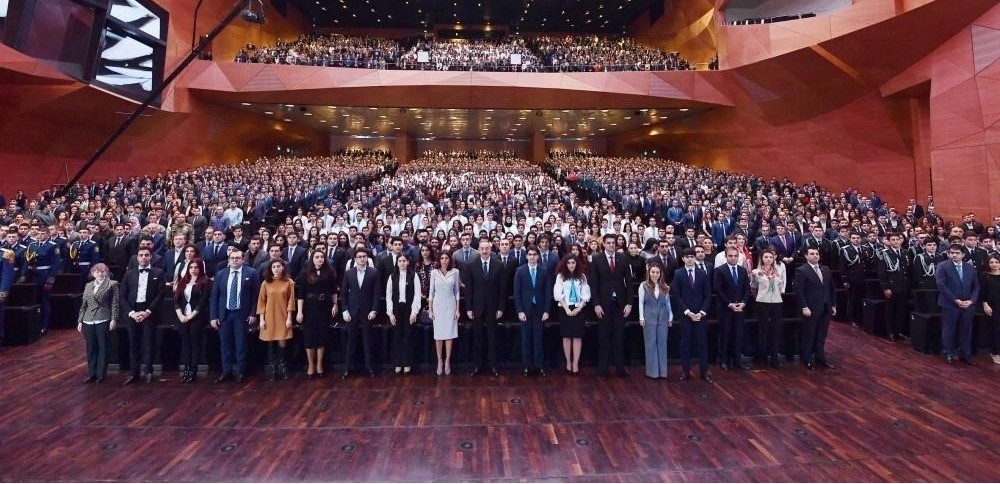Youth Policy
The foundation of youth policy in modern independent Azerbaijan was laid by the National Leader Heydar Aliyev. After the Great Leader returned to power in 1993, at the request and insistence of the people, paying attention to the young generation became one of the priority directions of state policy, and many signed documents determined the goals, principles and directions of youth policy, as well as its organizational and legal foundations.
As a result of the successful continuation of this policy by Mr. President Ilham Aliyev, today the youth of Azerbaijan actively participate in all spheres of the country. More than 20 adopted laws, strategies, state programs and other normative-legal acts include the provision of state care to the young generation. In our country, the Presidential Award for youth has been established, 2007 has been declared the "Year of Youth", the Azerbaijan Youth Foundation, the "Youth House" network of social service institutions have been created, and state support mechanisms have been formed to represent young people at international events and support their ideas and initiatives.
The Azerbaijan Trade Unions Confederation (AHİK) also actively supports youth policy within its powers, implementing appropriate measures to strengthen their social protection, protect labor rights, and develop their potential.
Appropriate measures are being taken to ensure the representation of young people in trade union structures and their formation as highly qualified specialists. Currently, a number of projects are planned to be implemented to improve and increase the efficiency of work with young people.
In the field of work with youth, activities are aimed at the following areas:
• participate in education in the spirit of patriotism on the basis of national and moral values;
• support for labor, social and economic rights, as well as support social significant initiatives and to direct their innovative potential to the development of society;
• redirect the knowledge and skills of young people, as well as the potential to resolve the country's socio-economic development;
• organize the students in trade unions and call membership campaigns and events in this direction;
• increase efforts to engage in entrepreneurial activities of young people; implement projects in this direction;
• support the activities of the Student Trade Union Committees; take initiatives to support their programs and projects;
• carry out the measures to improve the system of privileges, improving the employment, improving their working conditions, improving their working conditions, strengthening the level of living conditions, students and students, young workers and specialists;
• support the integration of groups of young people in the labor market;
• strengthen the social protection of young people, to take the necessary measures to the effective organization of leisure times, the formation of their healthy lifestyle culture;
• undertake an appropriate work to improve your training and security system;
• Implement preventive measures to prevent the prevention of drug addicts and other negative cases among young people;
• prepare the proposals for the establishment of measures to be taken to reveal talented young people, to establish awards to encourage them;
• encourage the involvement of young people into the Volunteer Movement, as well as to achieve a wide application in subordinate institutions and member organizations;
• ensure the organization of employers' organization's initiatives in the field of corporate social responsibility, organization of "Best Social Project of the Year", " Young Profesional of the Year" and "Best Trade Union for Youth for Youth";
• organize the festival, competition, seminar, conference, round table, training and other events in the interests of young people, etc.
Gender policy
The concept of gender equality includes equal rights, duties and opportunities of people, regardless of gender. This factor, which plays an important role in the development of society, is one of the important factors for ensuring equal access to education, employment and career. Studies have shown that countries with a high level of gender equality have more stable economic indicators.
Trade unions are also an active participant in promoting gender equality.
Trade unions, as organizations that defend the interests of workers, play an important role in achieving gender equality in the workplace. The main areas of activity in this area are protection of workers ' rights, education and information, promotion of relevant changes in legislation, support of women in the trade union.
So, trade unions:
Strategy of socio-economic development of the Republic of Azerbaijan for 2022 - 2026↗
Decree of the President of the Republic of Azerbaijan on the establishment of the Presidential Prize for Youth↗
Azerbaijan 2030: National priorities of socio-economic development↗
On guarantees of gender (men and women) equality ↗
About preventing domestic violence ↗
